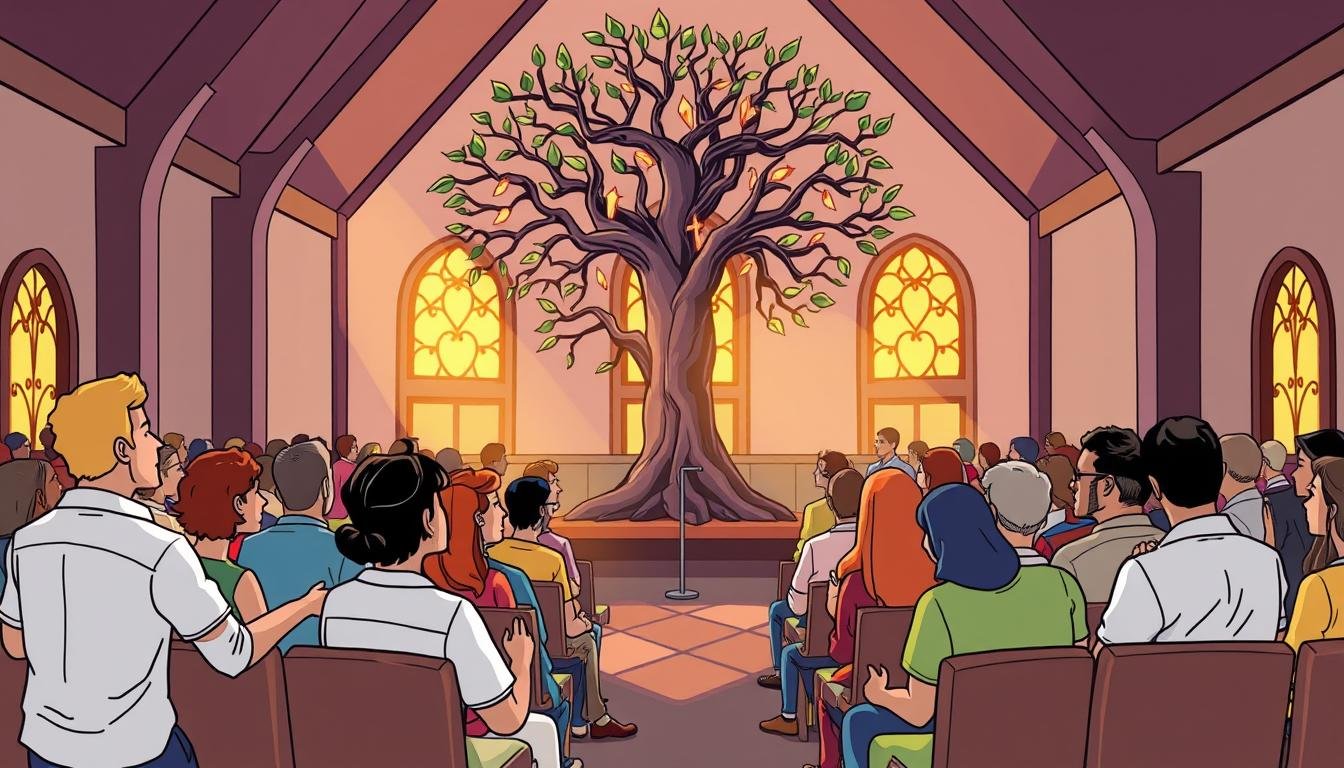What if the foundation of your church’s structure was clearly laid out in scripture, yet remains largely overlooked? This article explores the deep teachings in the Bible about church organization. It shows how the Bible gives us clear principles for church governance.
These principles highlight the crucial role of believers in building a strong community. By looking at key verses, we gain insights into scripture’s role in church leadership. We also learn the value of unity in diversity, helping us understand effective church governance.
Understanding the Importance of Church Organization
Church organization is key to building a united and mission-focused community. It brings clarity to roles and responsibilities. This clarity helps members grow spiritually and reflects God’s order in their interactions.
Church organization shows its value by promoting structured governance. This allows believers to get involved in ministry and community service. It’s a way to serve together effectively.
The New Testament talks about different church leaders like elders, overseers, and deacons. This setup ensures good leadership and teamwork among church members. The early church had a team of elders, showing the importance of shared responsibility.
Organized structures also improve communication and accountability. A strong church is built on these principles. It allows for effective ministry that follows biblical teachings.
An organized church can handle today’s challenges while staying true to its mission. This is crucial for its survival and growth.
The Role of Scripture in Church Governance
The New Testament shows how scripture guides church leadership and decision-making. It gives a clear blueprint for church governance structures.
Guidance from the New Testament
In the New Testament, elders play a key role in church leadership. Acts 14:23 and Titus 1:5 mention their importance. They work together to create a balanced leadership.
The terms “bishop” and “elder” are often used the same way. This shows they share leadership in the church. The Bible sets clear standards for elders and deacons, like in 1 Timothy 3:2 and 8. These standards highlight the need for integrity and spiritual maturity in leaders.
Examples from the Early Church
The early church valued everyone’s input in governance. Acts 15 tells the story of the Jerusalem Council. It shows how apostles and elders worked together to solve big issues.
Elders didn’t just lead; they also handled practical tasks, like giving out relief funds. This shows scripture guides leadership, not just informs it. The role of deacons as servant leaders is another example of balanced leadership in the New Testament. Each role is important for the church’s health and success.
Bible Verse About Church Organization
Exploring church organization through Scripture offers valuable insights. Two key passages, Acts 2:42–47 and 1 Timothy 3:14–15, guide the church’s structure and community life. They support a strong church community model.
Acts 2:42–47: A Model for Community Life
Acts 2:42–47 shows early Christian life filled with shared beliefs and practices. It talks about constant devotion to teaching, mutual fellowship, and sharing. The early church showed unity and generosity, selling possessions to help each other.
This example teaches us the value of building relationships based on faith and love. It reminds us of the importance of community in the church.
1 Timothy 3:14–15: The Church as God’s Household
In 1 Timothy 3:14–15, Paul calls the church God’s household. He talks about the importance of relationships in a healthy community. Each member is responsible to act properly within the church.
This view of the church as a family promotes unity, respect, and care. These are key for a thriving church community model.

The Characteristics of Early Church Leadership
The early church had certain leadership qualities that helped shape effective ministry and community life. These qualities are still important today for church leaders. Key aspects included teaching, fellowship, and sharing resources.
Devotion to Teaching and Fellowship
Early church leaders were deeply committed to teaching the apostles’ words. This showed how important the Bible is for understanding and growing spiritually. They also worked hard to create a space for fellowship, where people could connect and support each other.
This focus on community helped build love and unity among believers. It made the church a strong, united body of Christ.
Financial Generosity and Sharing
Financial generosity was another key trait of early church leaders. They encouraged others to give and also gave themselves. Acts shows how early Christians sold things and shared, making sure everyone had what they needed.
This act of generosity not only met physical needs but also brought people closer together. It showed the power of working together for the good of all.
The Principle of Unity in Diversity
The idea of unity in diversity is a key part of the Bible. It shows that people with different gifts and backgrounds can work together as one body in Christ. The New Testament stresses the importance of church unity among believers.
Romans 12:4-5 explains how each member adds to the whole. It says that diversity in the church is celebrated, not just tolerated.
Jesus prayed for His followers to be united in John 17:20-21. He wanted them to be more than just acknowledging their differences. He wanted them to form deep connections.
The early church showed this by welcoming people from all nations without creating separate groups. This shows they understood the value of biblical diversity principles for a unified mission.
Leadership in the church also follows this principle. Christ is the head, guiding all authority. Leaders like the apostles and elders work under Him.
The Apostle Paul was key in keeping the Galatian church united despite their differences. His work shows the importance of church unity and inclusivity.
Paul’s leadership and teaching changed how churches were organized. He challenged old customs, promoting acceptance and fellowship. This approach shows that following traditions shouldn’t stop the church’s mission.
By embracing diversity, churches can be stronger. They can work together, showing the true meaning of diversity within church life. This way, churches can better represent Christ to the world.
The Role of Christ as the Head of the Church
Understanding Christ as the head of the church is key to knowing church authority and governance. Ephesians 1:22–23 tells us that God placed all things under Christ’s feet and appointed him to be head over everything for the church, which is his body. This shows Christ’s supreme authority and His role in supporting the community of believers.
This principle means that every part of the church should show Christ’s leadership. His guidance is crucial for the church’s mission and structure. Jesus said in Matthew, All authority in heaven and on earth has been given to me. This sets the stage for understanding His rule over the church.
Paul also said Jesus is the only one who can truly lead the church. When we look at church leadership, it’s clear that leaders must follow Christ’s teachings. Churches that ignore His word will struggle to grow and fulfill His plans. Staying committed to Christ’s authority makes the church strong and effective.
For more on Christ’s role in the church, check out articles on church authority and leadership. They show how important Christ is in leading the church. Understanding Christ’s role helps in developing leaders and ensures all church activities match His plan for believers.
Building a Foundation for Church Structure
Creating a strong church structure starts with deep insights from scripture. Key texts like Colossians 1:17–20 and Ephesians 2:19–22 reveal Christ’s role and the church’s nature. These passages are crucial for understanding church governance and their practical use today.
Colossians 1:17–20 on Church Stability
Colossians 1:17–20 shows Christ’s key role in holding all creation together. It emphasizes His authority and importance. This scripture tells us that a good church leadership structure must center on Christ.
His guidance helps unite and stabilize the church. This creates a space where believers can grow. Relying on this truth helps leaders build a church filled with love, support, and unity.
Ephesians 2:19–22 on the Church as God’s Temple
Ephesians 2:19–22 adds to our understanding of church structure. It sees the body of Christ as a spiritual building with Christ as the cornerstone. This image shows how believers are connected, forming a strong community.
Each member is vital in showing God’s presence. The church is seen as a lasting temple, showing spiritual truths and our mission to serve and reflect God’s glory.
Spiritual Gifts and Their Impact on Church Organization
The idea of spiritual gifts in church is key to understanding how churches work well. The New Testament talks about different spiritual gifts, saying each person has a special role (Ephesians 4:12-13). With over 350 million charismatics worldwide using their gifts, it’s clear how these gifts help churches work together.
Each gift, like leadership or encouragement, is for the good of all (1 Corinthians 12: 4-7). This variety leads to teamwork and active participation in church activities. When people know their gifts, they can really help the church’s mission, making ministry and outreach better.
It’s important to understand the value of using our gifts wisely. We are called to use our talents and gifts well, representing Christ. This means using our gifts, time, and resources to help others. By using our gifts, we meet community needs and fulfill our purpose.
Using spiritual gifts takes effort and intention. People can pray, study the Bible, or take tests to find their gifts. This helps match personal interests with the church’s goals, making the church more effective. It’s crucial to seek God’s guidance to use our talents for the good of others and to honor God. For more on this, see spiritual gifts in the body of and learn more about church roles here.
The Priesthood of All Believers
The idea of the priesthood of all believers changes how we see church roles. 1 Peter 2:4-5 says every believer has a big role to play. This means no one is left out when it comes to serving and helping others.
1 Peter 2:4–5: A Call to Service
1 Peter 2:4-5 teaches that every Christian is a spiritual priest. This idea makes believers want to help each other more. It shows that everyone can play a part, no matter their title.
This teaching says all believers can talk directly to God because of faith in Christ. The tearing of the temple veil shows this direct connection. Pastors still lead, but everyone is needed to achieve the church’s goals.

Fostering Community Through Servanthood
Building a strong community in church starts with servanthood. Serving others shows love and sacrifice, just like Christ did. He said in Mark 10:45, “I came to serve, not to be served.” This teaching encourages believers to create a supportive place where everyone grows spiritually.
Servanthood is key to connecting church members. When people serve, they build strong bonds. This makes everyone feel valued and part of a community. It shows the world what faith looks like in action.
Serving others makes relationships stronger and helps the church’s mission grow. When everyone serves, the church becomes a place of growth and support. This environment helps the congregation show Christ’s love every day.
The Future of Church Organization
The future of church organization is changing. Churches will need to be adaptable, inclusive, and intentional in their leadership. They must embrace new ways to use technology and connect with their communities.
The Church of Jesus Christ of Latter-day Saints is leading the way. It’s growing fast and building temples for sacred purposes. This shows a strong focus on family and spiritual bonds.
Church leaders must follow biblical teachings and the Holy Spirit’s guidance. This will help churches stay relevant and share Christ’s message effectively.
But, there are challenges ahead. Members will face trials and persecution for their faith. Remembering their divine nature and worth will give them strength.
By focusing on helping others and serving willingly, churches can show true discipleship. This approach will help churches lead effectively in a complex world.
FAQ
What is the significance of church organization according to the Bible?
The Bible shows church organization is key. It helps set clear roles and responsibilities. This builds a strong community and helps the church carry out its mission well.
It also shows that God’s order is reflected in proper governance. This allows believers to serve their communities effectively.
Which Bible verses provide guidance on church leadership?
1 Timothy 3:1–13 talks about what church leaders should be like. Acts 6:1-6 shows how deacons were chosen to handle church tasks. These verses stress the need for integrity and teamwork in leadership.
How did the early church model community life?
Acts 2:42-47 shows how the early church lived together. They were devoted to teaching, fellowship, and sharing. They sold things and shared what they had, showing generosity and unity.
What does 1 Timothy 3:14-15 say about the church’s identity?
1 Timothy 3:14-15 calls the church God’s household. It reminds believers to act properly in their community of faith. This shows the church is like a family.
How does scripture address the diversity of gifts within the church?
Romans 12:4-5 talks about unity in diversity. It says that even though people have different gifts and backgrounds, they are all part of one body in Christ. This encourages everyone to work together and support each other.
What role does Christ play in the governance of the church?
Ephesians 1:22-23 says Christ is the head of the church. He is the ultimate authority and guide. Understanding this is key to aligning the church’s actions with His will, promoting healthy community dynamics.
Why are spiritual gifts important for church organization?
Spiritual gifts, as mentioned in 1 Corinthians 12:4-11, are vital for the church’s ministry. Recognizing and using these gifts helps create a supportive community. It allows everyone to contribute to the church’s mission.
How does the concept of the priesthood of all believers affect church engagement?
1 Peter 2:4-5 says all followers of Christ are called to serve each other. This creates a sense of responsibility and ownership in the church’s mission. It encourages everyone to participate in ministry, regardless of their title.
How can servanthood strengthen community within the church?
By following Christ’s example of servant leadership, as seen in Mark 10:45, church members build stronger relationships. This creates a caring environment for spiritual growth and fellowship. It shows the love of Christ in action.
What trends are shaping the future of church organization?
The future of church organization is being shaped by adaptability, inclusivity, and intentional leadership. Trends like digital ministry and community-focused engagement are changing traditional structures. Churches need to stay relevant and impactful in their mission.

Rockin’ the faith, one verse at a time!
Growing up, the Bible’s stories deeply impacted me. Now, with over 15 years of preaching experience, I blend timeless teachings with modern technology, making them relevant for today’s world.
Bible Hub Verse is my platform to share historical insights and thought-provoking articles, exploring both familiar and uncommon Christian topics. My passion is building a welcoming online space for everyone to learn, grow in their faith, and discover the Bible’s enduring message.
Join the journey!
God bless you.









